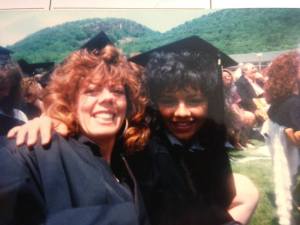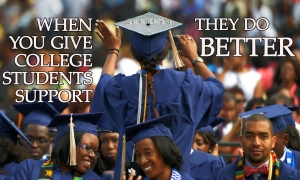We spent a lot of time these past couple of weeks talking about economic and demographic trends in education and, amusingly enough, it was something my mother talked about (albeit in a roundabout way) shortly thereafter. We were talking politics (something I try REALLY HARD not to discuss with my mother, as we’re on two opposite ends of the political spectrum), and the topic of education and “pulling yourself up by your bootstraps” (a phrase I LOATHE) came up. Like always happens in an Italian household on major holidays, this caused an argument. There are things I won’t bring up with my mother, both out of respect for her and out of a severe dislike for confrontation. However, since it connected to our work the past few weeks, I don’t mind talking about it here.
My mother went back to school when I was four to be a nurse. She graduated when I was 8. She was lucky–she was, technically, a single mom that entire time, working part time trying to make ends meet–but my father and my grandparents happily took me whenever she needed to study, go to work or class, or later, when she was doing her clinicals. That last year? She had me two days a week, with my grandparents and my father splitting the other five among themselves. And my mother managed to make it work. She graduated with honors from Quinnipiac with her associate’s in nursing, and in more recent years has gone back for her RN to BSN and later her master’s in nursing as well.

Why does this matter, I’m sure you’re asking right about now. It matters, because my mother was able to find reliable, safe, flexible child care whenever she needed without worrying about money. My mother was able to be a single parent and still work and go to school. Were we poor? Apparently, though between all of them I never knew it until I was an adult. Was it difficult for her? Probably, but not nearly as difficult as it is for the millions of single, low-income parents out there who want to better themselves but can’t because they don’t have reliable, safe, cheap child care. They don’t have the ability to get to class consistently. They might not have the time to study, or get homework done in silence, because they’re too busy going to work, coming home, helping their kids with their homework, making dinner, cleaning up, and putting their kids to bed. That’s a lot of work–work that (while I have all faith that my mother would’ve figured it out, because she’s nothing if not tenacious) I’m not entirely certain my mother would’ve been able to do on her own without all the help she had.
Which is why our conversation bothered me. It’s difficult to realize that your parents are so diametrically opposed to your views, even when you feel like they should be on the same side, given their struggles. My mother was that low-income single parent–the difference (and what has apparently made all the difference) is that my mother is white. At Post, the impression I get as an admissions counselor is that most of the students are low-income students. It’s a fact that well over half of enrolled students at Post are minorities, and it’s a fact that less than 50% of minority students finish a bachelor’s degree in six years, versus almost 70% for whites (Carey, 2008). That’s….a ridiculous number, and it speaks to the immense racial disparity that exists in the United States right now.
I know that I’m generally more humorous in my postings, but this is too big of an issue to joke about. I know that this is a point I’ve harped on in my class, but it’s a point that bears repeating, especially as my mother’s generation gets further out of touch with their pasts. Lower-income students need more support from their chosen universities. They need more support from us–period.

Assia Richardson, standing, waves to family members as she takes her seat for Howard University’s commencement with special guest Sean Combs on May, 10, 2014 in Washington, DC.
(Photo by Bill O’Leary/The Washington Post)
Maybe that support is through support services within the university. Maybe that support is from the government by way of social services. Maybe that support is some combination of both.But the fact remains that our low-income students need us–and we’re failing them. And THAT is unacceptable.
^THIS^ is how it’s done.
For a list of scholarships for single mothers, here is a great list to help you narrow down the search. You CAN do it–I believe in you.
Erica, we, too avoid political discussions when we have family get-togethers – BUT – sometimes things just need to be discussed. We do continue to fail a percentage of our population – and one that is unfortunately growing. The thing we too often want to do, however, is “throw money” at the situation instead of really looking at the kinds of things that would provide the help and support without creating dependency. I truly believe the future of our country depends on it!!
LikeLike